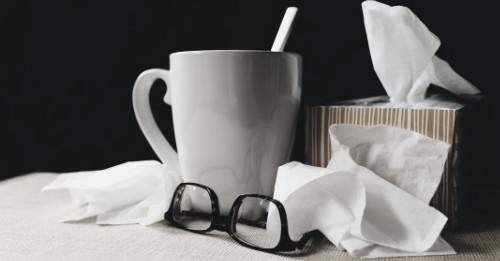Should I Be Scared of the Coronavirus? Mindfulness Techniques for Managing Coronavirus Anxiety at Home and Work

By Becky Greiner, guest contributor
What is Coronavirus?
Of all the newsworthy events that have happened so far in the new year, there’s one word that has stayed consistent in the media and is now at the center of a lot of daily coverage – Coronavirus, also known as COVID-19. While Coronaviruses are actually a large family of viruses that can range from the common cold to more severe diseases, this one in particular has been getting a lot of attention because it’s a novel virus, meaning it’s a new strain of the Coronavirus family.
The constant alerts and announcements about Coronavirus can be anxiety-inducing and leave you with a lot of questions — should I really be scared of the virus? What should I do to prepare? How will this affect my business? Whether you’re preparing for yourself and your family or you’re an employer wondering how to prepare your teams, there are several approaches you can take to cope.
Mindfulness can help you navigate the overwhelming amount of information about the current Coronavirus situation: Get familiar with the facts, understand how the brain works in these types of situations, know how you can calmly and rationally prepare, and bring an awareness to how you’re processing the information to help guide intentional action.
Should We Be Afraid of Coronavirus?
Ever since the spread of Coronavirus was first reported from Wuhan, China, on December 31, 2019, we have watched the virus cross the borders of multiple countries. With the number of infected countries continuing to climb, the World Health Organization (WHO) recently raised its risk assessment of the novel Coronavirus strain to “very high,” causing many to start feeling amplified anxiety over the virus.
From what we know so far, the most common symptoms of Coronavirus are fever, cough, and shortness of breath in less severe cases. It’s important to note that these can also be symptoms of the flu or the common cold, and if you haven’t been around anyone who’s traveled to Asia, Iran, or Italy or who has already tested positive for Coronavirus, then your chances for having the virus are very small. But to help keep your mind at ease if symptoms do begin to emerge in your home or work environments, knowing when to call the doctor and go in for clinical testing can be beneficial.
Although the Coronavirus has now been found in limited numbers in the U.S. and is also occurring alongside a very busy flu season, there are ways to prepare yourself and your workplace so everyone can stay calm and rational during this time of uncertainty.
How Your Brain Views the Coronavirus
As helpful as your brain’s “fight or flight” response can be to protect you from potentially dangerous situations, it can also stir up anxious thoughts during events such as the global spread of the Coronavirus. Although the common flu is estimated to have affected over 32 million people in the U.S. alone since October 2019, COVID-19 has much fewer cases worldwide so far.
So, why is your brain fixating on the dangers of the Coronavirus when the regular flu season has affected so many more people? The flu is familiar; we all learn about it early on in life so we know what it is and how to handle it as adults. New viruses like COVID-19 can be a little scarier than an existing virus, and all of that uncertainty can make it easy for your brain to latch onto anxious thoughts and spiral.
While it’s good to have awareness of what’s going on, taking a moment to be present with your anxious thoughts and feelings can help you discover whether your thoughts are fact-based or whether you are experiencing a stress response to the uncertainty of the situation.
Understanding the difference between the two can help you maintain your inner peace as more information is gathered.

Moderate Your Media Coverage of the Virus
Most of us have at least one screen in front of us for most of the day, and it’s easy to fall into one of two camps – people who watch and read every media source available about the Coronavirus and people who choose to avoid the topic altogether to focus on “happier” things. Both responses are valid when there is a new virus spreading, but there is also a way to mindfully merge both camps into a calmer middle ground.
Getting information and updates about the Coronavirus is important, but tuning into sensationalized media coverage that’s meant to induce anxiety and panic can be counterproductive to maintaining your personal or professional environments. Setting personal boundaries and limiting your media updates to fact-based, frequently updated government websites can help you stay informed without triggering anxiety or worry. These resources include:
Managers and team leaders can also utilize these resources to have fact-based discussions about the Coronavirus with their teams and open to the door to team members feeling safe to address any fears they may have about the virus.
What You Can Do Right Now to Prepare for Coronavirus
It can be difficult to know how to prepare during the age of a new virus because there is still a lot of uncertainty, but fortunately, there are easy things that we can all do now to help reduce our risk and the risk of those around us:
- Hand hygiene is still one of the most important things we can do to help stop the spread of the Coronavirus and most illnesses, especially in public places. When washing your hands, avoid doing it hastily. Instead of doing this simple activity out of fear, you can bring awareness to the moment to make it a pleasant experience. Observe the sensations of massaging the soap onto your hands and fingers. Take at least twenty seconds to do this before rinsing with warm water, taking a few more moments to rinse and feel the splash of warm water, and pause to notice the cooling sensation that follows once you’ve dried them.
- Wear masks only if you are feeling symptomatic, if you are taking care of someone who is or if you’re traveling.
- Stay home or work remotely if you are feeling sick to help prevent further spread of illnesses. If remote work is new to you or your team, consider taking a step back to reorient and reconnect yourself and team. Try this by using the one-minute or three-minute Mindful Meeting Moment to kick off your next meeting with clarity and focus.
Discover how mindfulness can help take care of yourself and others with our Loving Kindness on-demand content!
Tips for Making a Plan with Your Family and Team
An important component of mindfulness is accepting things as they are but choosing how to react to them, and that same principle can be applied to the current situation. While you cannot change that the Coronavirus has spread, you can choose how you want to react to it, and making a plan at home and work can help you react with confidence and rationality.
Planning at home
- Stock up on medications and food to limit time spent in public spaces.
- Use the latest government recommendations if family members become symptomatic.
- Have open, safe discussions where your feelings and the feelings of your family are validated and addressed can also help maintain an environment of peaceful calm.
Planning for the workplace
- Have plans in place for working remotely and encouraging use of available sick days can help companies take care of their teams.
- Employers should also create safe spaces of open, nonjudgmental conversation about the Coronavirus to help employee wellness.
- If you cough or sneeze, cover your mouth and nose and use a napkin as opposed to your hand.
- Use alcohol wipes to sanitize your workspace, phone and any other technology you touch.
- Avoid touching your face with your hands.
Remain Calm (and Aware)
It’s difficult to turn a blind eye to the urgent news stories and panicked responses to the Coronavirus across the globe, but approaching the situation mindfully can help you, your family, and your workplace cope and plan calmly and rationally. Focus your attention inward to your thoughts and feelings about the situation and validate that your mind will want to “go down the rabbit hole” with anxious thoughts since this is a new viral strain.
But rather than fearing the Coronavirus, understanding the symptoms, assessing whether anyone you are in contact with is symptomatic, and making a plan at both work and home are all ways to confidently prepare. The CDC, the WHO, and other reputable government websites that don’t sensationalize the topic are great sources to follow for real, un-sensationalized facts about the current status of the Coronavirus, and those sites will also have the most up-to-date instructions for the best ways to keep yourself and everyone around you safe during this unique flu and illness season.
This article originally appeared on eMindful's website. It is republished with their permission.
Becky Greiner is a mindfulness teacher for eMindful. eMindful provides evidence-based, mindfulness programs for everyday life and chronic conditions and delivers measurable results by helping individuals make every moment matter with greater focus, creativity, and purposeful decisions.

8 comments
I appreciate the information; however, I believe it is detrimental to show pictures of masks that DO NOT protect against COVID-19. The masks in the pictures are exactly the ones people should not be wearing. Anyone who needs the protection of a mask should wear an N95 respirator or surgical mask like the one shown here: N95 mask
It is also important that once someone wears a mask that they dispose of it and then wash their hands. N95 masks are not widely available; even hospitals are running low. Only people who are medically fragile or feel they may be contagious should be wearing an N95 mask.
Thank you.
Thank you, Valerie! I wasn't aware that those masks are not the ones that you can wear if you're already showing symptoms to protect other people. I really appreciate you letting us know. I've updated all of the pictures in this article.
Warmly,
Claire
Thank you for this clear and relevant article that provides useful info!
Thank you for your comment, Daniel! I'm glad to hear it helped.
Great read Claire - i think it would also be helpful for people to know that this mutation is far more dangerous than the flu and can leave long term damage on the infected individuals even if they survive it. And why it is important that they need to practice strict hygiene and quarantine protocols / social isolation which you did cover in your article. Thank you. Be safe and be well - Namaste!
Thank you for letting me know, Sai! I'll pass this comment onto Becky. I hope you're well too.
Things have changed so much since this article was written! Since then we’re in lockdown, people are dying in more numbers than the flu and we in the Uk and parts of the US were so I’ll prepared for this even though it was known about since December m. That’s the scary part. That those in powers didn’t respond appropriately because of not wanting to spend the money or whatever. I am finding it hard not to panic and worry st this time. I’m making use of all the free meditations and talks out there and I pray my anxiety subsided with time. Thanks 🙏🏽
Hi Jewel, I hope you're staying safe and well. You're welcome to join us for free meditations - we're now hosting them every hour. You can learn more here: https://www.mindfulleader.org/meditate-together
Leave a comment